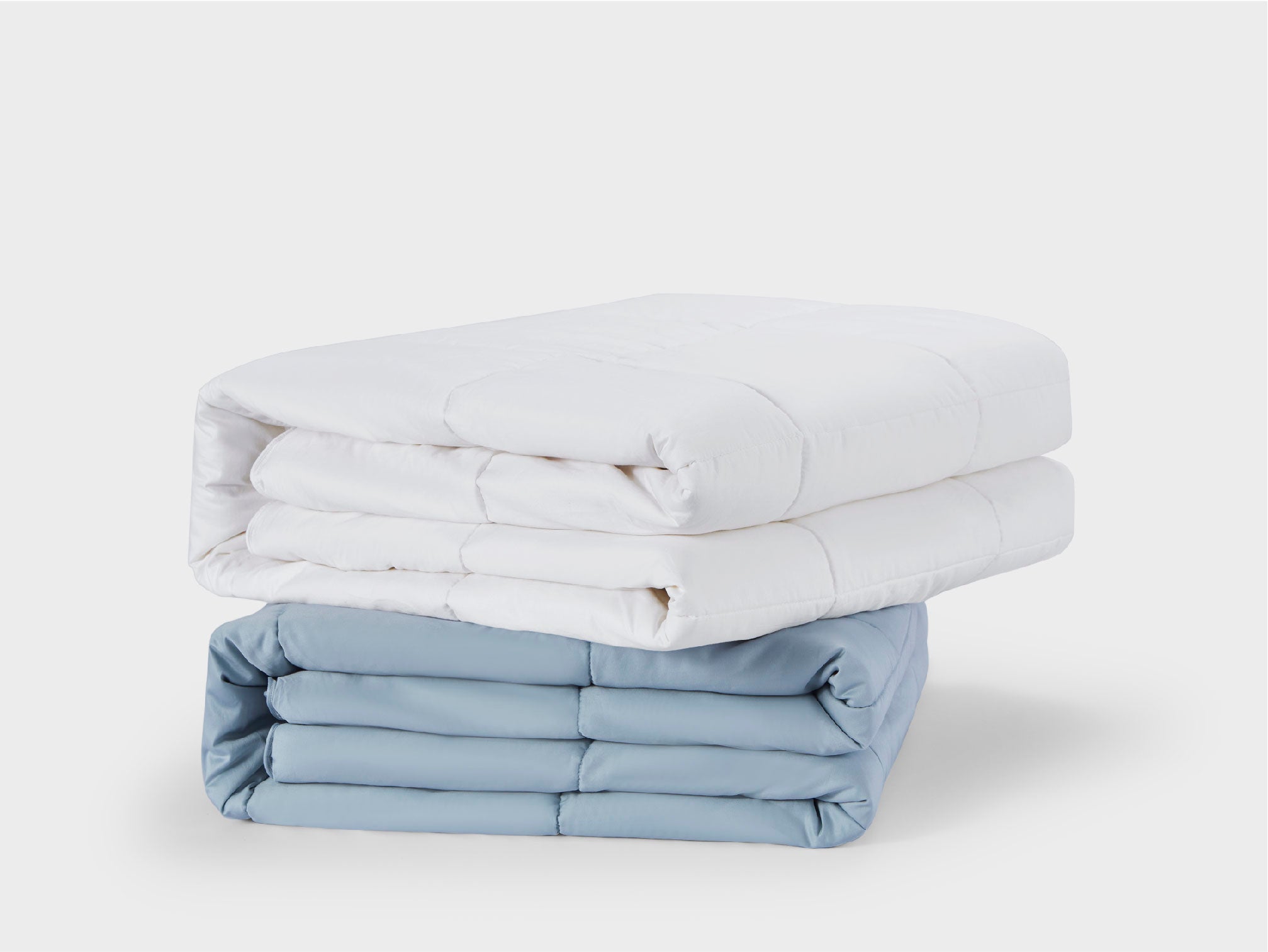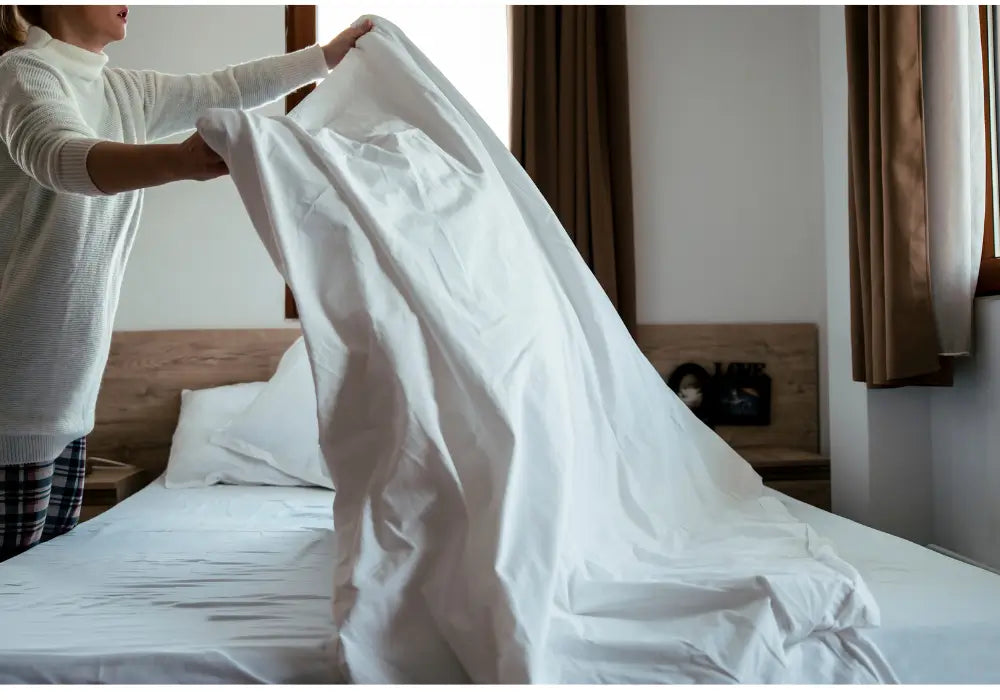While static electricity may be alarming, it is actually harmless on your sheets. As the fall and winter seasons approach, static electricity begins to build up as the air dries out and we move around in bed.
This article will delve into the causes of static electricity on your sheets, how to prevent it, and the benefits of using anti-static bedding.
What Causes Static Electricity In Bed Sheets?
Static electricity occurs when an imbalance of electric charges builds up on the surface of materials. This usually happens when two materials rub against each other or separate. Several factors contribute to the buildup of static electricity in bed sheets:
1. Friction Between Fabrics
When materials like your sheets and pajamas rub together, friction causes electrons to transfer from one material to another. This friction generates static, especially if you’re using synthetic fabrics like polyester. The more you toss and turn in bed, the higher the likelihood of static buildup.
2. Dry Air
Dry air is one of the main reasons for static electricity. In winter, indoor heating reduces humidity levels, which allows static to accumulate. Moisture in the air helps dissipate electric charges, but when there’s little humidity, the charges remain on your sheets, leading to static shocks.
3. Synthetic Bedding Materials
Materials like polyester and nylon are more likely to generate static than natural fibers like cotton. These synthetic fabrics do not hold moisture well, which makes them prone to static electricity. If you use synthetic bedding, it’s more likely you’ll experience static buildup.
How To Prevent Static Electricity In Bed Sheets
Static electricity in bed sheets can be a frustrating and uncomfortable experience, especially during dry winter months when the air has low humidity. Thankfully, there are several simple and effective ways to reduce or eliminate static electricity in your bedding. Here’s how you can prevent static buildup and enjoy a more comfortable sleep.
Use A Humidifier
One of the best ways to reduce static electricity is to add moisture to the air. A humidifier keeps the air moist, preventing static charges from building up. This is especially important in winter when indoor heating dries out the air. Keeping the humidity level between 30% and 50% can greatly reduce static.
Avoid Over-Drying Your Sheets
Over-drying your sheets in the dryer can remove too much moisture, increasing static buildup. To prevent this, remove your sheets from the dryer while they are still slightly damp or use a lower heat setting. This retains some moisture in the fabric, reducing the chance of static electricity.
Use Wool Dryer Balls Or Fabric Softeners
Wool dryer balls create space between fabrics in the dryer, reducing friction and static. Fabric softeners coat the fibers of your sheets, making them less likely to generate static. Both options are effective in minimizing static electricity.
Apply Fabric Softener Or Anti-Static Sprays
Using a fabric softener in your washing machine can help reduce static by coating your sheets with a thin layer that prevents static buildup. Similarly, anti-static sprays can be used directly on your sheets before bedtime to neutralize any existing static. These sprays are easy to use and provide a quick fix for reducing static electricity in your bedding.

Choose Anti-Static Bedding
Choosing anti-static bedding made from natural materials is a smart long-term solution for avoiding static electricity. Natural fabrics like cotton and linen are less prone to static buildup, providing a more comfortable and static-free sleep. These materials are also breathable and eco-friendly, improving sleep quality and supporting a sustainable lifestyle. Our silk bedding Souver Silk Filled Classic Duvet-All Season will not create static or uncomfortable. It’s naturally hypoallergenic and helps regulate temperature, making it an excellent choice for those with sensitive skin or allergies.
Benefits Of Anti-Static Bedding
Anti-static bedding is specifically designed to prevent the buildup of static electricity. It is typically made from natural materials such as cotton, silk, and linen, which help absorb moisture and dissipate electric charges. By using moisture-retaining fabrics, these sheets and duvets can neutralize static before it builds up, providing a more peaceful sleep environment.

Comfort
One of the key benefits of anti-static bedding is the added comfort it brings. Static shocks from regular sheets can be frustrating and interrupt your sleep. Souver Faux Rabbit Fur Blanket uses tightly woven conductive fibers and relies on corona discharge to stay static-free. This helps prevent static shocks and lets you enjoy a calm, uninterrupted night’s sleep
Improved Sleep Quality
Static shocks can disrupt your sleep, causing you to wake up multiple times during the night. By using anti-static bedding, you can reduce these disruptions and improve your overall sleep quality.

Better For Sensitive Skin And Hair
Static electricity can dry out your skin and make your hair frizzy, which is another reason to choose anti-static bedding. Natural fibers like silk are particularly beneficial for your skin and hair because they reduce friction, helping you wake up with smoother skin and less frizzy hair.
Silk is a natural fiber made of protein and has built-in anti-static properties. Unlike synthetic fabrics like polyester or nylon, silk generates much less static electricity. This is due to its lower friction, which helps prevent the buildup of static charges.
Choose Souver Mulberry Silk Pillowcase protects your hair by reducing friction, helping to prevent breakage, minimize tangles, and reduce frizz. It also helps keep your hairstyle in place overnight. The smooth texture of silk retains skin moisture, keeping dryness at bay. Made from 6A-grade mulberry silk, it's OEKO-TEX Standard 100 certified, meaning it's free from harmful chemicals. Naturally hypoallergenic, mulberry silk repels allergens, creating a sneeze-free, restful sleep environment—ideal for allergy sufferers.
Compared to synthetic fibers like polyester or nylon, silk excels in its ability to minimize static electricity. Synthetic fibers have a higher propensity to generate static charges due to their molecular structure and higher friction coefficient. Silk’s natural properties make it less likely to generate static electricity, offering a more comfortable and static-free sleeping environment.
Long-Lasting Durability
Natural materials like cotton and silk get softer with each wash, resisting wear and tear to keep your bedding durable and comfortable for years, it tends to last longer than synthetic options.
Eco-Friendly And Sustainable
Anti-static bedding made from renewable and natural fibers like cotton, silk, and linen is not only better for your sleep but also for the environment. These materials are biodegradable, renewable, and often produced with minimal impact on natural resources.
In Souver, we focus on providing high-quality, eco-friendly household essentials. We use natural, sustainable, and environmentally friendly materials like organic cotton, lyocell, Chinese silk, and bamboo fiber. Our production process avoids harmful chemicals to ensure safer, healthier products. We're dedicated to protecting the environment while creating comfortable, sustainable homes for customers.
Choosing lightweight and airy bedding made from sustainable materials contributes to eco-friendly living.
Conclusion
Static electricity in bed sheets is not dangerous, but it can be annoying. The small shocks you feel are harmless, but they can disrupt your sleep and cause discomfort. Thankfully, there are easy ways to reduce or eliminate static in your bedding. Using a humidifier, opting for natural fiber sheets, and avoiding over-drying your bedding are all effective solutions. Additionally, investing in anti-static bedding can help ensure a comfortable, shock-free sleep environment. With these tips, you can eliminate static electricity and enjoy a restful night’s sleep.
FAQ
1. Can Static Electricity On Beds Cause Fires?
Static electricity on bed sheets does not start fires. Although it can cause small sparks, the type of static you encounter at home—on carpets, clothing, or blankets—is harmless. It might give a quick shock, but it doesn’t produce enough heat to ignite fabrics or cause any harm. However, static discharge can ignite flammable materials if they are nearby.
2. What Are The Effects Of Too Much Static Electricity?
Serious static electricity can irritate the skin and cause discomfort, including feelings of irritability, dizziness, tightness in the chest, and throat irritation. Magnetic fields can cause changes in blood flow around the heart, which appear as irregularities in the ECG. These currents moving through the heart muscle may affect the heart’s rate or rhythm and even lead to bronchitis, asthma, or irregular heartbeats
3.Why Do I Get Electrocuted When I Touch The Bed?
Some bedding materials are more likely to give you a static shock in the dry winter months. Fabrics like rayon, acetate, polyester, and nylon are known for causing static. To avoid this, choose natural materials such as cotton, wool, silk, or linen. These fabrics are less prone to static and provide a more comfortable sleep.
4. What Season Is More Prone To Static Electricity?
During winter, static electricity tends to get worse because the air is drier. Cold air holds less moisture than warm air, which leads to dry conditions. Just like how our lips and hands can become cracked and dry, low humidity in winter increases the chances of static buildup.








留言
此網站已受到 hCaptcha 保護,且適用 hCaptcha 隱私政策以及服務條款。